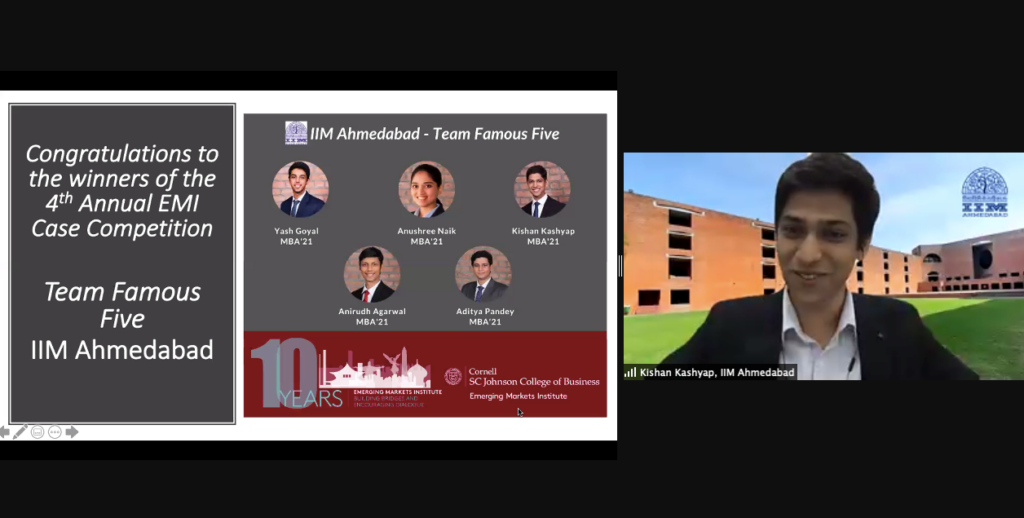Cornell EMI Corning Case Competition
2024 Cornell Emerging Markets Institute Corning Case Competition
Cornell Emerging Market Institute Conference is the United States’ leading annual forum for discussing the ongoing trends and phenomena in our world’s rapidly growing emerging markets. This year’s Conference is centered around the theme of Innovation and Transformation to Emerge Stronger. The Cornell EMI Corning Case Competition is a key event at the Conference.
The goal of the case competition is to identify and answer questions that real businesses and managers are posing today in relation to Emerging Markets. The growing role of Emerging Multinationals in the Business world continues to evolve, and this case competition seeks to challenge us to come up with the win-win solutions for the company.
This year’s edition reached a record of 705 participants, representing 154 teams from 48 institutions across 15 countries, including Bangladesh, Canada, China, Colombia, Ecuador, India, Japan, Mexico, Nepal, Nigeria, the Philippines, Portugal, Spain, the United States, and Vietnam. The case this year featured the challenges for an EV company from Vietnam.
Congratulations to the winners. They presented their solution during the EMI Conference 2024 on November 1 at Bloomberg Auditorium, Cornell Tech, NYC. Watch the recording here.

Winners:
- 1st Prize: Vinception, VinUniversity (Vietnam)
- 2nd Prize: OnsenTamaGO, Ritsumeikan Asia Pacific University (Japan)
- 3rd Prize: Team RedBricks Solutions, Carlson School of Management, University of Minnesota (United States)
Other finalists (alphabetical order):
- Andes Insight, Universidad de los Andes (Colombia)
- Avinya, Indian Institute of Management Bangalore (India)
- Axe Global, Shaheed Sukhdev College of Business Studies, University of Delhi (India)
- Aztlan CG, EGADE Business School, Tecnológico de Monterrey (Mexico)
- The Strategists, BITS School of Management (India)
Timeline

Overview
Competition Registration:
There is no registration fee for participants.
Please go to the Cornell EMI Corning Case Competition website to register your team by the following dates:
Registration Deadline: September 12th, 2024 by 11:59 PM
Each team invited to the final round in NYC will be given a $1,000 travel stipend.
Round 1 Notification, Case Distribution, and Submission Deadlines:
Team registration applications will be reviewed after the final day of registration. The case will be distributed to you on September 15, 2024 via email.
Teams have seven days to work on the case. Teams cannot contact the company in the case, or anyone directly affiliated with the case. Submission details will be provided in the email. Please see below for formatting requirements.
The deadline to submit the case is no later than September 21, 2024 at 11:59 PM EST. If the submission is late, your team will not be considered for finals.
Prizes*
1st place: $6,000
2nd place: $3,000
3rd place: $1,000
*The award is subject to tax withholdings as required by IRS regulations.
Rules and Format
Teams:
Participants in the case competition come from MBA and other graduate or undergraduate programs in the United States and from across the globe (we highly recommend including at least one graduate level participant).
In Round 1 of the case competition, schools may be represented by a maximum of three teams, each consisting of 4-5 students. Students can register for only one team.
If more than three teams are registered for a given school, the main point of contact for that school will be contacted and is responsible for providing the final three teams for registration. If needed, we recommend schools independently host a preliminary competition to select the three teams. Schools are welcome to use previous years’ cases for their school competition. This must be completed prior to the registration deadline. If the school takes no action in selecting a maximum of three teams, then the EMI Case Competition Committee will use the Case Competition application essay to select the final three teams that will participate in the competition.
While students on the team(s) can belong to any graduate program, we recommend that at least one student is an MBA student. If the team has two or more MBA students, we encourage that at least one student is a first-year MBA student or from a one-year MBA/Executive MBA program. Undergraduate students may also compete as part of a team.
Each team must have a faculty sponsor who will serve as the primary point of contact for questions from the Committee. The faculty sponsor’s name and contact information must be provided in the application. Teams are also allowed to have an advisor. If you prefer, the faculty sponsor may also serve as the advisor. Please notify the EMI Case Competition Committee (contactemi@cornell.edu) that your team has an advisor and include his/her name/position in your case submission.
Teams cannot change or add members once registered. In the event of an emergency, please contact the EMI Case Competition Committee (contactemi@cornell.edu). Exceptions will be reviewed on a case-by-case basis.
Process
Round 1 – Proposal
- Each team’s submission will be reviewed by judges and evaluated using the rubric below.
- Five final teams will be announced on October 1, 2024.
- Presentation slides must be formatted using Microsoft PowerPoint.
- Each team is allowed a maximum of 12 presentation slides (the first two slides must be a Title slide followed by an Executive Summary slide), and a maximum of 5 slides of appendices.
- This presentation will also be used in Round 2 – no edits will be allowed.
- You must record an audio presentation using Zoom to accompany your slides. Your recording must be six minutes or less and will only be used for Round 1 evaluation.
- Instructions for Recording: If you do not have Zoom, please create a free account and download the free software. Ensure your cameras are disabled and your microphone is enabled. Please share your screen, so the slides are displayed. Press the record button and begin presenting your slides. At the end, please stop recording and submit the recorded file with your submission. If you need further instructions, please reference this video.
- Teams must include their team’s name on the title slide.
- Teams may not mention their respective university or program in their presentations.
- If your team received assistance from an advisor, include his/her name and position in the title slide.
- Any avenue of primary and secondary research is allowed so long as it does not violate copyrights. Key details within this Case must be kept confidential and not be shared with external parties.
- Additional media such as music and third-party animation are prohibited.
- File size cannot exceed 15 MB.
Round 2 – Final Presentation
- Finalists will present their case analysis and recommendations from Round 1 to a panel of judges at the 2024 Cornell EMI Corning Case Competition Final that will take place on October 31st, 2024.
- Teams will be given 12 minutes for the final presentation and approximately 5 minutes for Q&A from the judges. Note: The audio component that you provided in Round 1 will not be used for Round 2.
- Please note that teams that exceed the 12-minute presentation will be cut off. Some questions may also be cut off. This is to ensure all teams have the same amount of time to present and answer questions.
- At least two team members must attend the final presentation in-person. If any team members are unable to attend the final presentation, please notify contactemi@cornell.edu
- No university logos or colors should be worn during the presentation.
- Winners will be announced during the final, and they will present during the EMI Conference on November 1st, 2024.
Evaluation
Rubric
From the Round 1 submissions, five final teams will be selected to present their case analysis and recommendations to a panel of judges at the 2023 EMI Conference on November 3, 2023.
The finalists will be chosen by a panel of Round 1 judges who will score the preliminary submissions based on the following criteria:
Content (80%):
| Criteria | Weight |
|---|---|
| Quality of Analysis | 0.4 |
| Quality of Recommendation | 0.2 |
| Implementation/Plan of Action | 0.2 |
| Creativity of Ideas | 0.2 |
Form (20%):
| Criteria | Weight |
|---|---|
| Handling of Questions | 0.4 |
| Presentation Style | 0.6 |
Content (80%):
- Quality of analysis
Teams will be assessed on the scope, thoroughness, and depth of their analysis. Teams should showcase that they have conducted deep research, addressed all key components of the problem, conducted qualitative and quantitative analysis, and addressed major threats/opportunities.
- Quality of Recommendation
Teams will be assessed on the realism and practicality of their recommendations, which should be strategic. Teams will also be assessed on the justification of their recommendations. Teams should ensure recommendations logically tie-in to the analysis and therefore be backed by data. Teams should consider the anticipated impact of their recommendations on the organization and its stakeholders.
- Implementation/Plan of Action
Teams will be assessed on the thoroughness and achievability of their implementation plan. Teams should propose an implementation timeline, address short term and long run considerations, conduct an analysis of unforeseen problems/risk and identify realistic ways to mitigate risks.
- Creativity of ideas
Leaders of the 21st century should think outside the box. This is greatly encouraged in the case competition. Teams will be assessed on their ability to employ out-of-the-box thinking to maximize the value of their recommendation to stakeholders. Teams should move beyond simply processing information and push themselves to come up with unique and innovative recommendations.
Form (20%):
- Handling of questions
Teams should demonstrate forethought and preparation for questions. Teams should be able to defend their position, be persuasive and precise, and be balanced across the team.
- Presentation style
Teams should display great communication skills and professionalism. Teams should thoughtfully manage their presentation time. Presentation slides should progress in a logical sequence and be visually aesthetic. When relevant, teams should try to effectively use infographics to communicate findings.
Judges
2024 Committee













